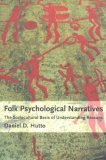‘Folk Psychological Narratives’ by Daniel D. Hutto
Written on January 10, 2008
Recently issued by MIT Press: Folk Psychological Narratives: The Sociocultural Basis of Understanding Reasons (Bradford Books) by Daniel C. Hutto.

From the book description:
Established wisdom in cognitive science holds that the everyday folk psychological abilities of humans–our capacity to understand intentional actions performed for reasons–are inherited from our evolutionary forebears. In Folk Psychological Narratives, Daniel Hutto challenges this view (held in somewhat different forms by the two dominant approaches, “theory theory” and simulation theory) and argues for the sociocultural basis of this familiar ability. He makes a detailed case for the idea that the way we make sense of intentional actions essentially involves the construction of narratives about particular persons. Moreover he argues that children acquire this practical skill only by being exposed to and engaging in a distinctive kind of narrative practice.
Hutto calls this developmental proposal the narrative practice hypothesis (NPH). Its core claim is that direct encounters with stories about persons who act for reasons (that is, folk psychological narratives) supply children with both the basic structure of folk psychology and the norm-governed possibilities for wielding it in practice. In making a strong case for the as yet underexamined idea that our understanding of reasons may be socioculturally grounded, Hutto not only advances and explicates the claims of the NPH, but he also challenges certain widely held assumptions. For example, he targets the idea that the primary function of folk psychology is to enable us to predict the behaviors of others. In this way, Folk Psychological Narratives both clears conceptual space around the dominant approaches for an alternative and offers a groundbreaking proposal.
Amazon has “Search Inside the Book” for this title.


